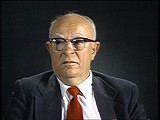<< Previous | Displaying results 2126-2150 of 6719 for "" | Next >>
-
Leo Melamed describes the German occupation of Bialystok
Oral HistoryLeo was seven years old when Germany invaded Poland in September 1939. Before the war, Leo's father was a mathematics teacher and member of the Bialystok City Council. Fearing arrest, Leo's father fled Bialystok for Vilna just before the German occupation. Leo and his mother eventually joined his father in Vilna. After the Soviets occupied Vilna, Leo's father obtained transit visas to Japan. The family left Vilna in December 1940, traveled across the Soviet Union on the Trans-Siberian Express, and arrived…
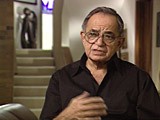
-
Leo Melamed describes fear after German occupation of Bialystok
Oral HistoryLeo was seven years old when Germany invaded Poland in September 1939. Before the war, Leo's father was a mathematics teacher and member of the Bialystok City Council. Fearing arrest, Leo's father fled Bialystok for Vilna just before the German occupation. Leo and his mother eventually joined his father in Vilna. After the Soviets occupied Vilna, Leo's father obtained transit visas to Japan. The family left Vilna in December 1940, traveled across the Soviet Union on the Trans-Siberian Express, and arrived…
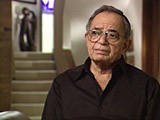
-
Leo Melamed describes fleeing by train from Bialystok to Vilna
Oral HistoryLeo was seven years old when Germany invaded Poland in September 1939. Before the war, Leo's father was a mathematics teacher and member of the Bialystok City Council. Fearing arrest, Leo's father fled Bialystok for Vilna just before the German occupation. Leo and his mother eventually joined his father in Vilna. After the Soviets occupied Vilna, Leo's father obtained transit visas to Japan. The family left Vilna in December 1940, traveled across the Soviet Union on the Trans-Siberian Express, and arrived…
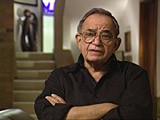
-
Felix Horn describes antisemitism in Lvov and conditions in the Janowska camp
Oral HistoryFelix was born to an assimilated Jewish family in Lublin, Poland. His father was a locksmith and his mother was a singer. Following the German invasion of Poland on September 1, 1939, Felix fled east to Rovno and then to Soviet-occupied Lvov, where he was accepted at a medical school. After the German invasion of the Soviet Union in June 1941, Felix was taken to a labor camp. He escaped and returned to Lublin, and found that his family had been forced into the ghetto established there. After the…
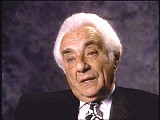
-
Wilek (William) Loew describes the hiding place in which his mother survived an Aktion in Lvov
Oral HistoryWilek was the son of Jewish parents living in the southeastern Polish town of Lvov. His family owned and operated a winery that had been in family hands since 1870. Wilek's father died of a heart attack in 1929. Wilek entered secondary school in 1939. Soon after he began school, World War II began with the German invasion of Poland. Lvov was in the part of eastern Poland annexed by the Soviet Union. Although the Soviets took over Wilek's home and the family business, Wilek was able to continue his…
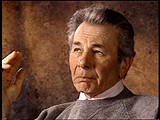
-
Wilek (William) Loew describes the roundup of Jews during August 1942 deportation from Lvov to Belzec
Oral HistoryWilek was the son of Jewish parents living in the southeastern Polish town of Lvov. His family owned and operated a winery that had been in family hands since 1870. Wilek's father died of a heart attack in 1929. Wilek entered secondary school in 1939. Soon after he began school, World War II began with the German invasion of Poland. Lvov was in the part of eastern Poland annexed by the Soviet Union. Although the Soviets took over Wilek's home and the family business, Wilek was able to continue his…
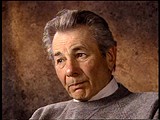
-
Lucine Horn describes conditions in the Lublin ghetto
Oral HistoryLucine was born to a Jewish family in Lublin. Her father was a court interpreter and her mother was a dentist. War began with the German invasion of Poland on September 1, 1939. Lucine's home was raided by German forces shortly thereafter. Soon after the German occupation of Lublin, Jews there were forced to wear a compulsory badge identifying them as Jews. A ghetto in Lublin was closed off in January 1942. Lucine survived a series of killing campaigns and deportations from the ghetto during March and…
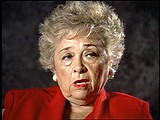
-
Rochelle Blackman Slivka describes the formation of the Vilna ghetto
Oral HistoryThe Germans occupied Vilna in June 1941. In October, Rochelle and her family were confined to the Vilna ghetto, where her mother died. Her father, a Jewish council member, was killed in a camp in Estonia. When the ghetto was liquidated in 1943, Rochelle and her sister were deported--first to the Kaiserwald camp in Latvia and later to Stutthof, near Danzig. In 1945, on the sixth week of a death march that forced the sisters to protect their bare feet with rags, the Soviet army liberated them.
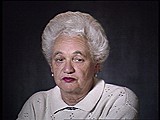
-
Judith Meisel describes smuggling food as a child into the Kovno ghetto
Oral HistoryUpon her father's death, Judith and her family moved to Kovno. Soon, they were confined to the ghetto, which the Germans formed in 1941. Judith, her mother and sister were deported to Stutthof, where her mother died. Judith and her sister escaped from a death march out of Stutthof. They posed as non-Jews, found farm work and eventual refuge in Denmark. Their brother survived Dachau.
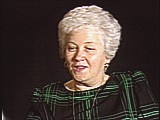
-
Israel Ipson describes forced labor to construct an airplane runway
Oral HistoryIsrael was raised in Kovno, Lithuania, and graduated from law school there in 1933. Because of anti-Jewish discrimination, he was unable to practice law. The Germans invaded the Soviet Union in June 1941, occupying Lithuania. The Kovno ghetto was established that August. By claiming to be a mechanic, Israel escaped several massacres. He was forced to work on a wooden airport runway outside the ghetto. After he escaped, Israel, his wife, and son hid in a potato pit for 9 months until liberation by Soviet…
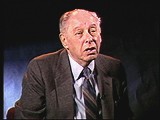
-
Henny Fletcher Aronsen describes a roundup in the Kovno ghetto
Oral HistoryHenny was born into an upper-middle-class Jewish family in Kovno, Lithuania. She and her brother attended private schools. In June 1940 the Soviets occupied Lithuania, but little seemed to change until the German invasion in June 1941. The Germans sealed off a ghetto in Kovno in August 1941. Henny and her family were forced to move into the ghetto. Henny married in the ghetto in November 1943; her dowry was a pound of sugar. She survived several roundups during which some of her friends and family were…
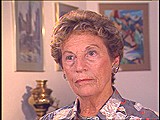
-
Abraham Malnik describes massacre in Kovno's Ninth Fort, near the Kovno ghetto
Oral HistoryAbraham came from a wealthy family that was ordered into the Kovno ghetto after the Germans occupied Lithuania in 1941. Abraham's mother urged his father to flee, but he returned for them. Begging for mercy, he was able to save them from a massacre in the Ninth Fort, one of several forts around Kovno. Abraham and his father survived internment in five camps before they were finally liberated in the Theresienstadt ghetto. Abe's mother perished at the Stutthof camp.
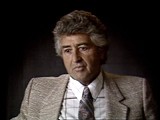
-
David Levine describes hiding his two-year-old nephew during a roundup of children in the Kovno ghetto
Oral HistoryDavid was born to a middle class Jewish family and attended a Jewish school. In August 1941, after the Germans occupied Kovno, he was forced into the Kovno ghetto, where he shared two rooms with his immediate and extended family. Many members of his extended family were killed during the Great Aktion in Kovno in October 1941. David worked in a forced-labor brigade in the ghetto. In March 1944, he witnessed the Kinder Aktion and was able to save his nephew. During the destruction of the Kovno ghetto, David…
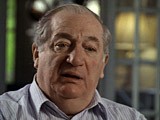
-
Hanne Hirsch Liebmann describes harassment and anti-Jewish sentiment in Germany
Oral HistoryHanne's family owned a photographic studio. In October 1940, she and other family members were deported to the Gurs camp in southern France. In September 1941, the Children's Aid Society (OSE) rescued Hanne and she hid in a children's home in Le Chambon-sur-Lignon. Her mother perished in Auschwitz. In 1943, Hanne obtained false papers and crossed into Switzerland. She married in Geneva in 1945 and had a daughter in 1946. In 1948, she arrived in the United States.
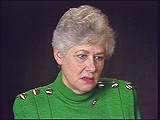
-
Samuel Gruber describes a German girl's reaction to learning that he was Jewish
Oral HistoryA Polish soldier, Samuel was wounded in action and taken by Germany as a prisoner of war. As the war continued, he and other Jewish prisoners received increasingly harsh treatment. Among the camps in which he was interned was Lublin-Lipowa, where he was among those forced to build the Majdanek concentration camp. In 1942, he escaped from the Germans, spending the rest of the war as the leader of an armed partisan group.
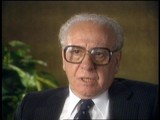
-
Benjamin (Ben) Meed describes Warsaw after the German occupation in 1939 and first experiencing antisemitism
Oral HistoryBen was one of four children born to a religious Jewish family. Germany invaded Poland on September 1, 1939. After the Germans occupied Warsaw, Ben decided to escape to Soviet-occupied eastern Poland. However, he soon decided to return to his family, then in the Warsaw ghetto. Ben was assigned to a work detail outside the ghetto, and helped smuggle people out of the ghetto—including Vladka (Fagele) Peltel, a member of the Jewish Fighting Organization (ZOB), who later became his wife. Later, he went into…
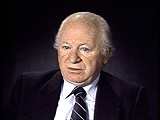
-
Abraham Lewent describes performing forced labor in Warsaw and increased Polish antisemitism
Oral HistoryLike other Jews, the Lewents were confined to the Warsaw ghetto. In 1942, as Abraham hid in a crawl space, the Germans seized his mother and sisters in a raid. They perished. He was deployed for forced labor nearby, but escaped to return to his father in the ghetto. In 1943, the two were deported to Majdanek, where Abraham's father died. Abraham later was sent to Skarzysko, Buchenwald, Schlieben, Bisingen, and Dachau. US troops liberated Abraham as the Germans evacuated prisoners.
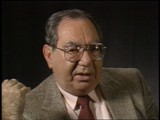
-
Bella Jakubowicz Tovey describes antisemitic remarks made as she was forced to march into the Graeben camp
Oral HistoryBella was the oldest of four children born to a Jewish family in Sosnowiec. Her father owned a knitting factory. After the Germans invaded Poland in 1939, they took over the factory. The family's furniture was given to a German woman. Bella was forced to work in a factory in the Sosnowiec ghetto in 1941. At the end of 1942 the family was deported to the Bedzin ghetto. Bella was deported to the Graeben subcamp of Gross-Rosen in 1943 and to Bergen-Belsen in 1944. She was liberated in April 1945.
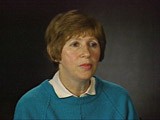
-
Fritzie Weiss Fritzshall describes the selection process in Auschwitz
Oral HistoryFritzie's father immigrated to the United States, but by the time he could bring his family over, war had begun and Fritzie's mother feared attacks on transatlantic shipping. Fritzie, her mother, and two brothers were eventually sent to Auschwitz. Her mother and brothers died. Fritzie survived by pretending to be older than her age and thus a stronger worker. On a death march from Auschwitz, Fritzie ran into a forest, where she was later liberated.
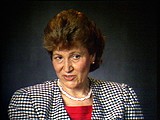
-
Hana Mueller Bruml describes arrival procedures at Auschwitz
Oral HistoryIn 1942, Hana was confined with other Jews to the Theresienstadt ghetto, where she worked as a nurse. There, amid epidemics and poverty, residents held operas, debates, and poetry readings. In 1944, she was deported to Auschwitz. After a month there, she was sent to Sackisch, a Gross-Rosen subcamp, where she made airplane parts at forced labor. She was liberated in May 1945.
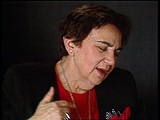
-
Blanka Rothschild describes arrival at the Ravensbrück camp
Oral HistoryBlanka was an only child in a close-knit family in Lodz, Poland. Her father died in 1937. After the German invasion of Poland, Blanka and her mother remained in Lodz with Blanka's grandmother, who was unable to travel. Along with other relatives, they were forced into the Lodz ghetto in 1940. There, Blanka worked in a bakery. She and her mother later worked in a hospital in the Lodz ghetto, where they remained until late 1944 when they were deported to the Ravensbrueck camp in Germany. From Ravensbrueck,…
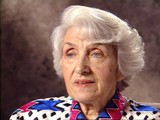
-
Ruth Moser Borsos describes forced-labor assignments in Westerbork
Oral HistoryRuth moved to the Netherlands after Kristallnacht (the "Night of Broken Glass") in 1938. She and her father had permits to sail to the United States, but Germany invaded the Netherlands in May 1940 and they could not leave. Ruth was deported to the Westerbork camp in 1943 and to the Bergen-Belsen camp in Germany in 1944. After an exchange agreement with the Allies broke down, Ruth was interned near the Swiss border until liberation by French forces in 1945.
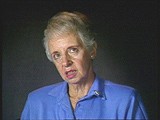
-
Dorotka (Dora) Goldstein Roth describes retaliation against women for an escape from Stutthof
Oral HistoryAfter the Germans invaded Poland in 1939, Dora's family fled to Vilna, Lithuania. When the Germans occupied Vilna, Dora's father was shot and the rest of the family was confined in the Vilna ghetto. Dora, her sister, and her mother were deported to the Kaiserwald camp in Latvia and then to the Stutthof concentration camp near Danzig. Her mother and sister perished in Stutthof. Dora herself was shot immediately before liberation, but she survived.
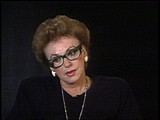
-
Madeline Deutsch describes the sacrifices her mother made to help her survive
Oral HistoryMadeline was born into a middle class family in an area of Czechoslovakia that was annexed by Hungary in 1938-1939. Her father worked out of their home and her mother was a homemaker. Madeline attended high school. In April 1944 her family was forced into a Hungarian ghetto. The family lived in the ghetto for two weeks before being transported to Auschwitz. Madeline and her mother were separated from her father and older brother. Neither her father nor brother survived the war. A week after arriving in…
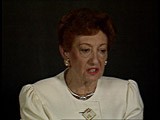
-
Joseph Stanley Wardzala describes forced labor in Hannover
Oral HistoryJoseph and his family were Roman Catholics. After Germany invaded Poland in 1939, roundups of Poles for forced labor in Germany began. Joseph escaped arrest twice but the third time, in 1941, he was deported to a forced-labor camp in Hannover, Germany. For over four years he was forced to work on the construction of concrete air raid shelters. Upon liberation by US forces in 1945, the forced-labor camp was transformed into a displaced persons camp. Joseph stayed there until he got a visa to enter the…
